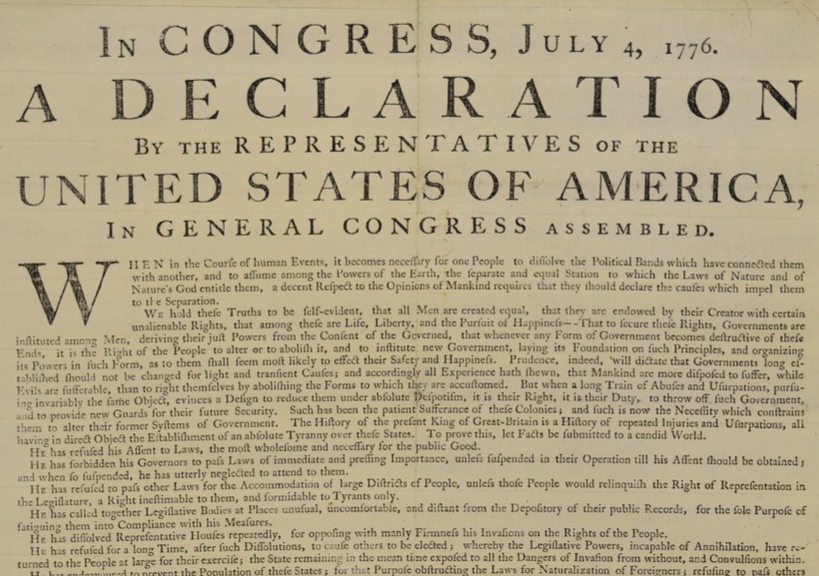Foundation of our Nation
The Declaration of Independence Founded a Theistic Republic
The Declaration of Independence has many turns of phrase that point to acknowledgment of God as explicit policy.

Mike Johnson opened his tenure as Speaker of the House with a speech citing the creator God mentioned in the Declaration of Independence. The speech drew criticism from columnists in the Washington Post, Time, PBS, and the New York Times, among others. Much of it shifted between Johnson’s support of Trump, his church affiliations, and his penchant for employing biblical language.
Each of the columns raced to the accusation that Johnson is a Christian nationalist. Yet none of them offered a counterargument to the fact that the Declaration of Independence actually does reference God in the course of justifying America’s separation from the British. The Declaration in fact makes four references to God, using the parlance of the 18th century.
The first reference is in its opening paragraph, which appeals to “the Laws of Nature and of Nature’s God,” thus grounding the legitimacy of the new “thirteen united States of America” in natural law and its divine author. This nation endeavors to conform to God’s moral order from its inception.
The second reference comes in the first sentence of the next paragraph and is the most famous: “that all men are created equal, that they are endowed by their Creator with certain unalienable Rights, that among these are Life, Liberty, and the pursuit of Happiness.” The securing of these rights concisely expresses the American understanding of government’s purpose. Government derives its “just powers from the consent of the governed.” But both government and the people are subordinate to the Creator, who stands outside the material world and brought all things into existence.
Thomas Jefferson and the Second Continental Congress presumed a common (although not coerced) belief in God. Without God, the fight for independence was unjust. Without God, the new nation had no duty to protect life and liberty. Without God the people’s right to pursue happiness, understood by the founders as the classical pursuit of goodness and virtue, would deserve no mention. Without God, the Declaration’s claims become sophistry, because the very concepts of justice, goodness, and truth are subject to constant redefinition based on the whims of the moment.
This understanding of God-given rights is why another body of representatives, including six who had signed the Declaration, enshrined religious liberty in the Constitution. Some things belong only to humanity’s Creator and must remain untouched by human officials. America’s limited government might assert faith in God, but it would not trample on conscience or coerce belief; even those citizens who deny the existence of God deserve life, civil liberty, and religious freedom.
The Declaration then moves through its specific condemnations of Britain’s monarch, explaining how the king has violated the Laws of Nature and Nature’s God and the liberties granted by the Creator. The concluding paragraph then makes a logical shift to the final two references.
It opens with the representatives’ appeal “to the Supreme Judge of the world for the rectitude of our intentions.” This bold invocation asks God to judge not only their words but their motives. This appeal hearkens back to the medieval concept of a trial by combat, where God will vindicate the just and punish the evil. Using an Enlightenment framework, Congress was arguing that virtuous citizens using their reason could achieve a victory by acting in accordance with the moral framework of the universe.
The closing sentence reiterates this belief in God as the cosmic judge. Congress pledges its “firm reliance on the protection of Divine Providence,” knowing that if they are proven wrong they will lose their “Lives,” “Fortunes,” and “sacred Honor.”
Even the least religious of the founders feared the judgment of God. Jefferson references God throughout his “Notes on the State of Virginia,” once again describing God as the Creator of the earth, man, and animals. Man is unique because he is the only animal that can create like the Creator. This sense of humanity as being created in the image of God prompted Jefferson to fear God’s “wrath” on a country that still allowed human beings to enslave one another, for liberty is “the gift of God.” Jefferson, a man deeply troubled by his own guilt in perpetuating slavery, wrote: “Indeed I tremble for my country when I reflect that God is just: that his justice cannot sleep for ever.” The same perfectly ordered and just being whom he believed would protect America during the Revolution would punish America if it did not end slavery.
So why does exploring the founders’ reliance on God in the Declaration matter today? Because it is the most fundamental matter at the root of every political question. Why are humans equal? Because God created them so. Why do all humans have dignity? Because they are created in the image of God. Why can government not solve every problem? Because it is not God. Why can our magistrates wage war or kill criminals? Because God delegated authority to civil government to punish evil and promote good. Why is governmental power limited in society and why must it protect human liberty? Because God distributed power to other human institutions (such as the family and the church), and every human being has a unique soul.
Civic theism for the authors of the Declaration moved beyond a narrow set of religious practices or beliefs. Individual founders differed in their doctrines, and yet they unanimously advocated for a theistic republic. It was built on the premise that a good God not only created the world but demanded justice, liberty, and equality from those who govern it. Remove its foundation, and a republic such as this is doomed to fracture and collapse.
Steele Brand is Professor of History at Cairn University. He serves as a residential scholar at the John Jay Institute and is a faculty fellow with the Jack Miller Center.
This article was originally published by RealClearReligion and made available via RealClearWire.
Steele Brand is Professor of History at Cairn University’s Politics, Philosophy, and History program, where he teaches courses in history and political thought, spanning from the ancient Near East to the early modern period. He also taught military history courses at the University of Texas-Austin. Brand received his Ph.D. from Baylor University and his M.A.Th. from Southwestern Seminary. He previously served as the Director of Undergraduate Fellows for the Clements Center for National Security and as a tactical intelligence officer.
Brand’s research focuses on the relationship between farming, citizenship, and soldiering. Constitutional polities—especially premodern, agrarian republics—cultivated a unique set of virtues and a deadly form of civic militarism that created tough citizens who were as involved in politics as they were proficient at defending their political system. Brand has written on these themes in his book, Killing for the Republic: Citizen-Soldiers and the Roman Way of War (Johns Hopkins, 2019). He has also published articles in journals such as Religions and Humanitas about how this premodern ideal of citizen-soldiers has informed and inspired modern republics, particularly the United States.
His teaching explores how the public life of the spirit binds people together within a polity. His classes also emphasize how these polities or collections of polities (civilizations) intersect in the great diplomatic and military events of history. And because the lives of specific individuals so often reflect and define this broader narrative, he uses anecdotes, primary source readings, and film to illuminate how certain men and women—often unexpectedly—directed the course of their people’s story.
-

 Executive5 days ago
Executive5 days agoWaste of the Day: Secret Settlements get Taxpayer Money
-

 Accountability2 days ago
Accountability2 days agoWaste of the Day: Principal Bought Lobster with School Funds
-

 Constitution1 day ago
Constitution1 day agoTrump, Canada, and the Constitutional Problem Beneath the Bridge
-

 Executive9 hours ago
Executive9 hours agoHow Relaxed COVID-Era Rules Fueled Minnesota’s Biggest Scam
-

 Civilization8 hours ago
Civilization8 hours agoThe End of Purple States and Competitive Districts
-

 Civilization4 days ago
Civilization4 days agoThe devil is in the details
-

 Executive3 days ago
Executive3 days agoTwo New Books Bash Covid Failures
-

 Executive3 days ago
Executive3 days agoThe Israeli Lesson Democrats Ignore at Their Peril













And the US Government is modeled after the Government the Jews started with in the Old Testament – a theocratic Republic. Which they then decided to replace with a monarchy.